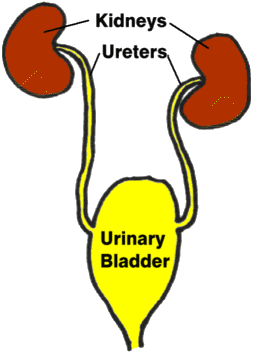
Graphic by MarVistaVet
Also known as pyelitis or upper urinary tract infection, pyelonephritis is an inflammation of the kidney, specifically of the parenchyma and renal pelvis.
Pyelonephritis is a common condition that frequently shows no symptoms, so it is usually not recognized until the signs become severe. It may not be diagnosed until tests are done on the kidney after the pet's death. The frequency of pyelonephritis increases with age.
It is caused by a bacterial invasion. The organisms invading the kidney may cause local or widespread lesions that destroy enough kidney tissue so as to cause kidney failure.
The kidney infection may come from the bladder through the ureters, through the bloodstream, or have invaded through other organs. Infection via the bladder/ureters is the most common route. The bloodstream route of infection may be caused by bacterial endocarditis, diskospondylitis, abscesses, and dental disease. Urinary stasis, urethral obstruction, kidney stones, trauma, and depressed immunity may predispose the pet to pyelonephritis.
Diagnosis
Diagnostic tests include blood work, urinalysis, urine sedimentation, X-rays and ultrasound of the kidney, urine culture, and other specific kidney tests.
Treatment
Treatment requires long-term antibiotic therapy. The antibiotics are chosen by sensitivity testing. It may only be necessary for 4 to 6 weeks, but some pets may need it for the rest of their lives. Because the disease is so difficult to cure, frequent testing is required to make certain the treatment is still working.
Monitoring and Prognosis
Urinalysis and urine culture are done 5 to 7 days after antibiotics begun, and done again one week after finishing them. Urine cultures are also done at 1, 3, and 6 months after completion to monitor for recurrence or reinfection. The pet's urine specific gravity is monitored frequently over the course of therapy, especially if the urine concentrating ability was initially impaired. A decrease in specific gravity after finishing the antibiotics may indicate a recurrence.
The prognosis for pyelonephritis varies. Overall, it is considered fair to good. Infections that involve the renal medulla are more difficult to get rid of, so those cases have a poorer prognosis. Patients with predisposing endocrine disease, persistent urinary abnormalities (e.g. nephroliths, neoplasia), or progressive renal disease have a worse prognosis.